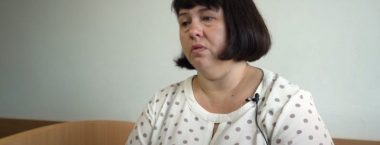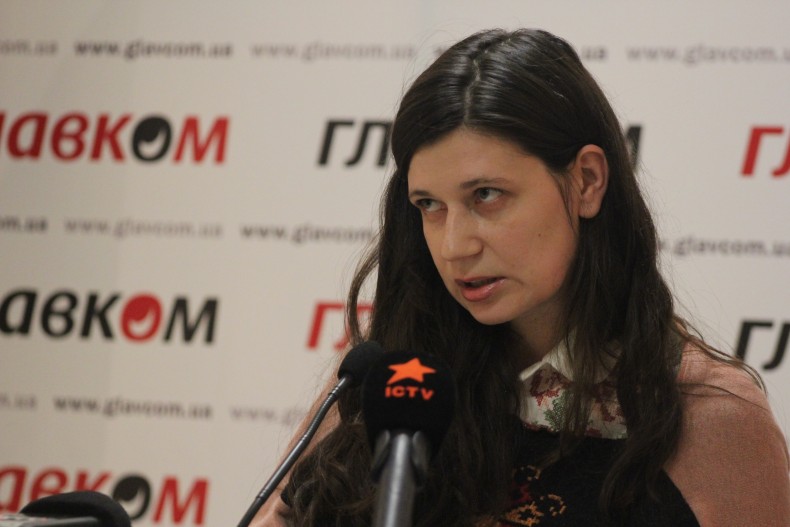
“People in their homes were dying from cold” – a nurse from Kharkiv
Interview by Taras Viychuk – I am 42 years old. I live and work in...
17 May 2022
13.01.2017
This is our fifth interview in the series of interviews “Female Human Rights Defenders, Who Change Ukraine”. This time, the gender expert Tamara Martseniuk talked to the lawyer of the Strategic Litigations Center of UHHRU Nadiya Volkova.
This series of interviews is dedicated to activists working in various areas of human rights protection. This year we celebrate the 40-th anniversary of the Ukrainian Helsinki Group, pioneers of Ukrainian human rights movement. UHHRU is its successor. We have developed an in-house policy of gender equality and non-discrimination and strive to make Ukrainian women human rights activist more visible in society.
The previous interviews are available for download here.
Nadiya Volkova is the lawyer of the Strategic Litigations Center of the Ukrainian Helsinki Human Rights Union. She studied at Oxford Brookes University, Inns of Court School of Law in the UK and Taras Shevchenko National University of Kyiv. Nadiya Volkova has considerable international experience, particularly at the Council of Europe, the European Court of Human Rights, the European Centre for Human Rights, Amnesty International and others. In Ukraine, she has been working as a human rights defender since 2014.
– Please share your history of involvement in the human rights movement in Ukraine. Why did you decide to work in this field?
– It so happened that while still at university, I became interested in human rights. I studied and worked abroad for a long time and started practicing human rights there. Due to personal circumstances, I returned to Ukraine in late 2012. Gave birth to the first child and after 3 months started work at the Council of Europe in Kyiv. In 2014, the war in the East had started. I wanted to get somehow involved and do something about this. When I realized that my experience and my desire to help people might have practical application in Ukraine in the human rights field, UHHRU opened a vacancy and I applied.
– Where have you got education and knowledge of human rights?
– As I said, I received education and experience abroad. Education – in the UK, and experience – in the UK, France, and America.
Somehow our state perceives human rights defenders as their enemies, not as helpers or allies. To me, this is the attitude of a teenager, for whom all those who are trying to suggest how to do correctly are being perceived as enemies of the people. This is a sign of immaturity.
– What is your area of focus in the field of human rights?
– I do not limit myself. I do not choose areas, but they choose me. More precisely, the more help is needed by people, the more I help. Currently, the main focus, of course, is the conflict in the East, but I also work on protection against gender violence, protection of people with disabilities, illegal detention, etc.
– Did you work with the theme of women’s rights?
– Yes, necessarily. But in terms of the development of regulatory and legal mechanisms. In 2011, I worked in a project of the Council of Europe, which focused on the promotion of the Istanbul Convention. Then in 2013, I worked on a similar project; in Ukraine, I work on preparation of Ukrainian legislation to ratify this Convention. The results are not those, which I would like to achieve, but at least the first draft law has been prepared, it needs voting. For this, there must be the political will, and it, as for many important things, is absent.
– In your opinion, what are the greatest successes of the human rights movement in Ukraine?
– The greatest success is that this movement appeared after Maidan. More precisely, it became active and systematically makes its presence felt. And the best indicator is that foreign organizations come here, looking for partners to develop certain areas (e.g. destruction of impunity), as well as donors become more active. If we compare donors and investors, their activity in Ukraine is a very important indicator.

– What are challenges of the modern human rights movement in Ukraine?
– The resistance of the state. Such an attitude is probably the Soviet legacy. Somehow our state perceives human rights defenders as their enemies, not as helpers or allies. To me, this is the attitude of a teenager, for whom all those who are trying to suggest how to do correctly are being perceived as enemies of the people. This is a sign of immaturity. Unfortunately. But this is so.
– In your opinion, is it enough attention paid to gender issue by the human rights movement?
– It is difficult to judge. Perhaps there is enough attention, but I’m not sure of its quality. Of course, all of this is subjective, and any attempt to deal with this problem cannot be ignored. But, in my opinion, because of misunderstanding of the root problems of substance and depth, very difficult to do something effective. Our society is not ready to deal with this problem. Again, if our society can not easily respond to men holding hands at the street, or beating a woman by her husband, by contrast, is seen as a household conflict, which is only a pretext for mockery of the law enforcement agencies, so we cannot speak about any progress. Therefore, all efforts to improve the situation are still low-effective.
– Gender-based violence is a serious problem, particularly in Ukraine. In your opinion, what should be done to improve the situation?
– Our society must be prepared, first, to change, and to change the attitude. However, this does not mean that we should fold hands and wait for the sun to shine. We must talk about the problems, conduct educational activities for young people, for public employees. We must make the subject interesting and important.
– What or who inspires you the most in your human rights work?
– My colleagues with whom I work side by side every day.
If you find an error on our site, please select the incorrect text and press ctrl-enter.

Interview by Taras Viychuk – I am 42 years old. I live and work in...
17 May 2022

The Kharkiv Human Rights Group (KHRG) is documenting international crimes (genocide, crimes against humanity, war...
14 April 2022

The Global initiative “Tribunal for Putin” invites to a closed online event “Kyiv region under...
12 April 2022

The Global initiative “Tribunal for Putin” invites to a closed online event “Kyiv region under...
12 April 2022